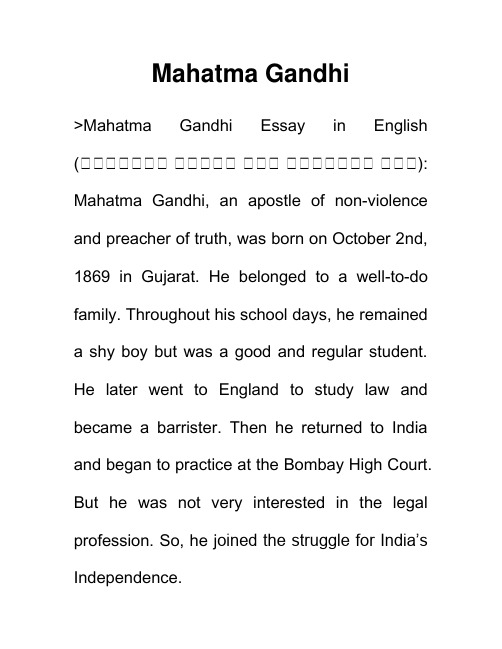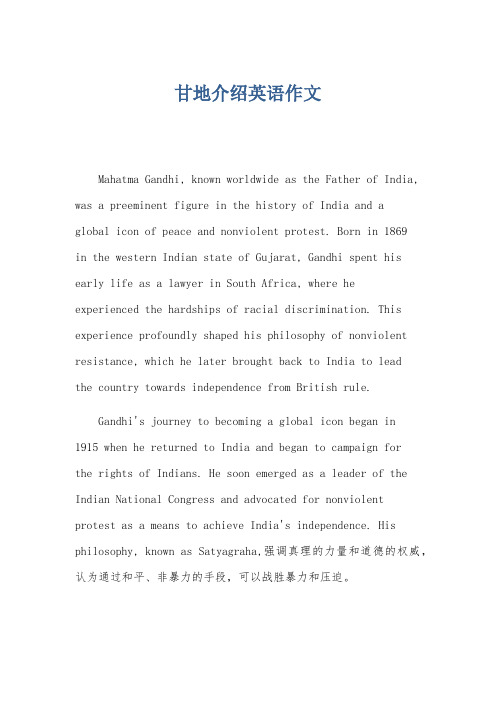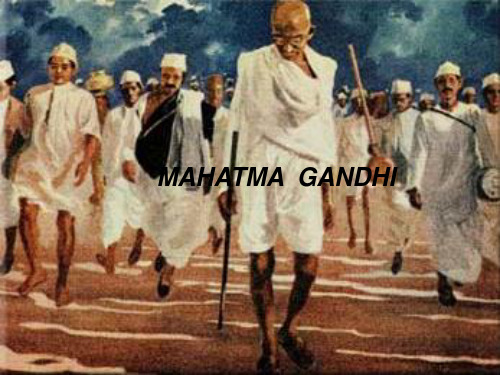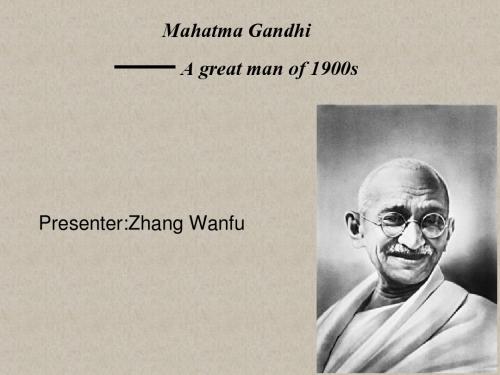甘地生平【英文】
介绍甘地英语作文

介绍甘地英语作文Mahatma Gandhi, also known as the Father of the Nation, was a great leader and a symbol of peace and non-violence. He was born on October 2, 1869, in Porbandar, India. He played a crucial role in the Indian independence movement against British rule.Gandhi was a highly educated lawyer, but he chose to lead a simple life and fight for the rights of the oppressed. He believed in the power of non-violence andcivil disobedience. His famous Salt March in 1930, where he and his followers walked 240 miles to the sea to make salt in defiance of the British salt monopoly, was a turning point in the Indian independence movement.Gandhi's philosophy of non-violence, also known as Satyagraha, inspired millions of people around the world. He believed that the means were as important as the end, and that violence only begets more violence. He led several peaceful protests and hunger strikes to bring attention tothe injustices of British rule in India.Gandhi's impact extended far beyond India. Hisinfluence on civil rights movements in the United States, South Africa, and other parts of the world is well-documented. Leaders like Martin Luther King Jr. and Nelson Mandela were inspired by Gandhi's principles of non-violence and used them to bring about social change intheir own countries.Gandhi's commitment to social justice and his unwavering belief in the power of non-violence continue to inspire people around the world. His legacy lives on in the hearts of those who continue to fight for equality, justice, and peace.In conclusion, Mahatma Gandhi was a visionary leaderwho dedicated his life to the pursuit of truth and justice. His philosophy of non-violence and civil disobedience has had a lasting impact on the world. He remains a symbol of hope and inspiration for people everywhere. Gandhi'steachings continue to be relevant today, and his legacy will continue to inspire generations to come.。
介绍名人 圣雄甘地 Mahatma Gandhi 英语作文

Mahatma Gandhi>Mahatma Gandhi Essay in English (ममममममममममममममममममममममममम): Mahatma Gandhi, an apostle of non-violence and preacher of truth, was born on October 2nd, 1869 in Gujarat. He belonged to a well-to-do family. Throughout his school days, he remained a shy boy but was a good and regular student. He later went to England to study law and became a barrister. Then he returned to India and began to practice at the Bombay High Court. But he was not very interested in the legal profession. So, he j oined the struggle for India’s Independence.Long and Short Essays About GandhijiHe went to South Africa. There, he made his best efforts to improve a lot of the Indians. He underwent all the sufferings but remained steadfast in his convictions.He could not bear the miserable plight of Indian masses suffering and starving under British rule. In order to uproot the Britishers from the Indian soil, Mahatma Gandhi sacrificed everything.His entire life is a saga of valor and sacrifices. Freedom was the br eath of Mahatma Gandhi’s life. In 1919 he started a non-violent andpeaceful movement. Hindu-Muslim unity, removal of untouchability and usage of Swadeshi (domestic-made) goods were his life-long missions. He launched the ‘Khadi Movement’ to encourage the use of handspun fibers like khadi or jute. ‘Khadi Movement’ was part of a bigger movement “Non¬co-operation Movement” which encouraged the use of Indian goods and boycotting of foreign goods.Get a > Mahatma Gandhi and >10 Lines on Mahatma Gandhi for Students and Children in EnglishEssay On Mahatma Gandhi in English (मममममममममममममममममममममममममम)Mahatma Gandhi was a man of sound and strong convictions. He had a noble soul. He wore very simple clothes and took simple vegetarian food. He was not only a man of words but also of action. He practiced what he preached. His approach to various problems was non-violent. He was a God-fearing person. He was the cynosure of all the eyes. He hated communalism in every shape or form. He was a friend of all and an enemy of none. He wasuniversally loved and liked. That’s why Indian masses bestowed him with the title ‘Mahatma’.The part played by Mahatma Gandhi on the stage of Indian politics is unforgettable. In those stormy days of the struggle for Indian Independence, Gandhi suffered and was imprisoned several times but freedom of his motherland remained his cherished goal. He guided many freedom struggles and launched the “Quit India Movement.”Conclusion on Mahatma Gandhi EssayHis tragic death on January 30th, 1948, plunged the entire nation into the gloom. He was assassinated by a Hindu frantic. His death was the greatest blow to the forces of peace and democracy. The memorable words of Lord Mountbatten are worth quoting, “India, indeed the world, will not see the likes of him perhaps for centuries.” His death left a great vacuum in the life of the nation. His birthday 2nd October is commemorated as ‘Gandhi Jayanti’, a national holiday in Indian, and worldwide as the ‘International Day of Non-violence’.The whole world still loves and respects this veteran of the twentieth century who has left an indelible mark on the sands of time.FAQ’s On Mahatma Gandhi EssayQuestion 1.What is the essay of Mahatma Gandhi?Answer:Mahatma Gandhi, an apostle of non-violence and preacher of truth, was born on October 2nd, 1869 in Gujarat. He belonged to a well-to-do family.Question 2.Why is Mahatma Gandhi called Father of Nation?Answer:Mahatma Gandhi is called as Father of Nation because he is the person who divides India from foreign dominations and established India as a nation.Question 3.Who was the father of the nation explain in a hundred words?Answer:Father of Nation is Mahatma Gandhi, his full name is Mohandas Karamchand Gandhi. He was conferred by Mahatma which means great soul and this name was given by his great friend Rabindranath Tagore. Gandhi was born at Porbandar in Gujarat in October 2nd, 1869.。
甘地英文介绍

…and thrown off a train when he refused to move to a third class compartment, after he had paid for a first class ticket
Copyright of , for more videos ,visit us.
Mohandas Gandhi was born in the state of Gujarat, India in 1869.
Copyright of , for more videos ,visit us.
At the age of thirteen Mohandas was married to Kasturba. The marriage had been arranged for him by his family. They had four sons.
When he was about to return to India, he heard that a law was going to be passed to prevent Indian people from voting.
He decided to draw attention to this injustice and became an activist. However, Gandhi said:
“Don’t make me read, make me understand “
– Full of ingredients to make your child a genius.
Copyright of , for more videos ,visit us.
‘There are many causes that I am prepared to die for, but no causes that I am prepared to kill for.’
甘地生平简介

甘地生平简介莫罕达斯·卡拉姆昌德·甘地(古吉拉特语;MahatmaGandhi,印地语;MohandasKaramchandGandhi,1869年10月02日-1948年01月30日),尊称圣雄甘地(MahatmaGandhi),是印度民族解放运动的领导人和印度国家大会党领袖。
他是现代印度的国父,是印度最伟大的政治领袖,也是现代民族资产阶级政治学说——甘地主义的创始人。
他的精神思想带领国家迈向独立,脱离英国的殖民统治。
他的“非暴力”(ahimsa)的哲学思想,影响了全世界的民族主义者和争取能以和平变革的国际运动。
虽受当时革新之风的感染,曾经尝试打破素食以强身健体、振兴民族国家,终因摆脱不了从小所受的教育,半途而废。
19岁时,不惜被开除种姓身份,远涉重洋,赴伦敦求学。
异域的文明曾令甘地产生过深刻的自卑而拜倒在它的脚下,宗教陈规的约束使他在一个全新环境里无所适从。
短时的迷惘与摸索之后,他终于放弃了对西方文明的盲目模仿,坚持了原有的宗教信仰并兼收并蓄其他宗教教义,接受了英国法制思想的教育,取得了伦敦大学的律师资格。
学成归国后,他开始在孟买从事律师业务,却历遭挫折。
第一次替人打官司就因临阵怯场而砸锅。
半年后打道回府,在家乡拉奇科特靠兄长和亲友的资助维持律师业务,律师业务的毫无起色及令人窒息的环境,使他倍感苦闷压抑。
当有个来自南非印度人的案子要他处理时,他便义无反顾地踏上了前往南非的历程。
反抗在南非这个种族歧视根深蒂固、无所不及的英国殖民地,甘地作为有色人种先后遭遇到了一连串的歧视与侮辱。
民族自尊心和同胞在此所受的苦难驱使他走上了领导南非印度人反种族视歧的斗争,成为引人注目的人物。
正是在南非这块充满种族歧视的土地上,甘地对他曾经倾慕过的西方文明产生了否定,培养和锻炼了自己从事公众工作的能力,掌握了作一个成功律师的秘诀,基本形成了他的宗教、人生观、社会政治观。
他在南非领导的艰苦卓绝的反种族歧视斗争,为南非印度人争取到了基本平等的权利,他从中也试验成功了一种有效的武器——真理与非暴力学说及其实践。
甘地介绍英语作文

甘地介绍英语作文Mahatma Gandhi, known worldwide as the Father of India, was a preeminent figure in the history of India and aglobal icon of peace and nonviolent protest. Born in 1869in the western Indian state of Gujarat, Gandhi spent his early life as a lawyer in South Africa, where heexperienced the hardships of racial discrimination. This experience profoundly shaped his philosophy of nonviolent resistance, which he later brought back to India to leadthe country towards independence from British rule.Gandhi's journey to becoming a global icon began in1915 when he returned to India and began to campaign forthe rights of Indians. He soon emerged as a leader of the Indian National Congress and advocated for nonviolentprotest as a means to achieve India's independence. His philosophy, known as Satyagraha,强调真理的力量和道德的权威,认为通过和平、非暴力的手段,可以战胜暴力和压迫。
介绍甘地身平的英语作文

介绍甘地身平的英语作文Mahatma Gandhi: A Life of Nonviolent ResistanceMahatma Gandhi, the revered leader of the Indian independence movement, was a man whose life and principles have left an indelible mark on the world. Born in 1869 in the small town of Porbandar, Gujarat, Gandhi's journey towards becoming one of the most influential figures of the 20th century was a remarkable one, marked by his unwavering commitment to the principles of nonviolence and civil disobedience.Gandhi's early life was shaped by his family's deep-rooted religious and cultural traditions. He was raised in a Hindu household, and his exposure to the teachings of Hinduism, Jainism, and other philosophies would later inform his worldview and the development of his unique approach to social and political change. As a young man, Gandhi studied law in London and later practiced as a barrister in South Africa, where he first encountered the harsh realities of racial discrimination and oppression.It was in South Africa that Gandhi's political consciousness was awakened, and he began to develop the strategies and tactics thatwould become the hallmarks of his nonviolent resistance movement. Faced with the unjust treatment of Indian immigrants in the country, Gandhi organized peaceful protests and civil disobedience campaigns, leading to his imprisonment on several occasions. It was during this time that he coined the term "Satyagraha," which translates to "truth-force" or "soul-force," and which would become the guiding principle of his entire political and social movement.Upon his return to India in 1915, Gandhi quickly became a central figure in the Indian independence movement. He recognized that the key to achieving independence from British rule lay not in armed rebellion, but in the power of nonviolent resistance and civil disobedience. Gandhi's tactics, which included the famous Salt March, the Quit India movement, and the Non-Cooperation movement, were designed to undermine the authority of the British government while simultaneously inspiring and empowering the Indian people.One of the most remarkable aspects of Gandhi's leadership was his ability to transcend the boundaries of religion, caste, and class. He believed that true freedom could only be achieved through the unity and cooperation of all Indians, regardless of their background. He worked tirelessly to bridge the divides within Indian society, advocating for the rights of the untouchables and promoting interfaith harmony.Gandhi's commitment to nonviolence was absolute, and he practiced what he preached. Even in the face of brutal repression and violence from the British authorities, he remained steadfast in his refusal to retaliate or resort to violence. His philosophy of nonviolent resistance, which he termed "Ahimsa," was rooted in the belief that the only way to achieve lasting change was through the power of moral persuasion and the transformation of one's adversaries.Throughout his life, Gandhi's personal example and moral leadership inspired millions of people around the world. He was a tireless advocate for the poor and the marginalized, and his vision of a just and equitable society continues to resonate with people of all backgrounds. Even in the face of personal tragedy and setbacks, Gandhi never wavered in his commitment to his principles, and his legacy continues to shape the course of global politics and social movements to this day.In the end, Mahatma Gandhi's life and work stand as a testament to the power of nonviolent resistance and the transformative potential of individual action. His unwavering commitment to truth, justice, and the dignity of all human beings has left an indelible mark on the world, and his legacy will continue to inspire generations to come.。
GANDHI-甘地英文传记

MAHATMA GANDHI
Gandhi had a ridiculous child marriage. In May 1883, the 13-year old gandhi was married to 14-year old indian girl(Kasturbai Makhanji) in an arranged child marriage,which was the custom in the region of india. And they had four sons
he joined the Vegetarian Society, was elected to its executive committe, Some of the vegetarians he met were members of the Theosophical Society, which had been founded in 1875 to further universal brotherhood, and which was devoted to the study of Buddhist and Hindu literature.
MAHATMA GANDHI
March to nt
MAHATMA GANDHI
Fasts
Gandhi used to be a vegetarian, and he have engaged in 17 times of fasts during his struggle for justice and independence in India.Each time of his fast might hold almost a week on the risk of lossing life,which was in oder to protest against the british authorities in India and wake up Indian passion and struggle for civil rights
人物介绍——甘地

基本信息:
中文名:莫罕达斯· 卡拉姆昌德· 甘地 外文名:MohandasKaramchandGandhi 信仰:印度教 国籍:印度 出生地:英属印度博尔本德尔 出生日期:1869年10月2日 逝世日期:1948年1月20日 职业:印度民族解放运动的领导人,印度民族主 义运动和国大党领袖 主要成就:被尊称为印度的“国父”
2:凑双完好的鞋子
一天,甘地坐火车,不小心把自己穿着 的一只鞋子掉在铁轨上了。此时,火车已经 轰隆隆地启动了,他已不可能下车去捡那只 鞋子。 旁边的人看到甘地没了一只鞋子,都 为他可惜。忽然,甘地弯下身子,把另一只 鞋子脱下来,扔出了窗外。身边的一位乘客 看到他这个奇怪的举动,就问:“先生,你 为什么要这样做呢?” 甘地笑了笑,慈祥地 说:“这样的话,捡到鞋子的穷人,就有一 双完好的鞋子穿了。”
3:人生中第一堂“非暴力”课
15岁时,甘地偷了哥哥手镯上的一小块 金子,良心受到谴责。由于不敢当面认错, 他写了一封悔过信交给父亲。他原以为会受 到重罚没想到病榻上的父亲读后泪流满面, 竟原谅了他,甘地感动得哭了。这是甘地人 生中第一堂“非暴力”课。他认为,父亲信 任与慈爱的力量远远胜过责骂和棒打。后来 他在自传中写道:“这些爱的眼泪洗涤了我 的心灵,抹拭了我的罪污。只有亲自经历这 种爱的人,才能认识它的价值,比世界上最有杀伤 力的武器还更有威力。 2:力量不是来自身体上的,而是来自不屈不挠的精 神。 3:满意在于努力,不在于达到。 4:真理,纯洁,自我控制,坚定,无畏,谦卑,团 结,和平,是一个反抗者必须具备的品质。 5:有爱的地方就有生命,仇恨导致毁灭。 6:爱是世界上最强有力的力量,同时也是最卑下的 想像。
纪念雕像:
出生于1869年的甘地是印度民族独立运动领袖、印度 国大党的创始人。他领导了“非暴力不合作运动”,以争 取民族独立。为争取祖国独立和人间公正,他一生中曾16 次绝食,18次进监狱,5次遇刺。1948年1月30日,甘地被 极右分子刺杀身亡,时年79岁。人们为了纪念他,在英国, 有数座甘地的塑像,最著名的是在他学习法律的伦敦大学 学院的附近的Tavistock Gardens。 在美国,旧金山的轮渡大楼停车场旁、休斯敦的 Herman公园、纽约的联合广场、亚特兰大的马丁· 路德· 金 纪念处、华盛顿Dupont Circle的印度使馆附近等多个地方, 都可以看到甘地的塑像。 在巴黎、阿姆斯特丹、巴塞隆那和里斯本,也有甘地 的雕塑。印度政府赠予加拿大的温尼伯市一座雕塑,表达 他们对将来安家于此的加拿大人权博物馆的支持。 在俄罗斯首都莫斯科市也有甘地的雕像。
英语甘地人物生平介绍作文

英语甘地人物生平介绍作文Gandhi was born in 1869 in Porbandar, a coastal town in Gujarat, India. His early years were marked by a deeply religious upbringing, which would later influence his philosophy of nonviolence.In 1888, he left for London to study law. The experience broadened his worldview and exposed him to new ideas, which he would later integrate into his life's work.Returning to India in 1891, he found limited success as a lawyer. However, his life took a pivotal turn when he accepted a legal case in South Africa, where he was first exposed to the harsh realities of racial discrimination.Gandhi's 21 years in South Africa were transformative. He developed his philosophy of Satyagraha, a form of nonviolent resistance, which he would later employ in India's struggle for independence.Upon his return to India in 1915, he became a leader in the Indian National Congress, advocating for India's independence from British rule. His campaigns were marked by his use of nonviolent civil disobedience, which inspired millions.Gandhi's most famous campaigns included the Salt March in 1930 and the Quit India Movement in 1942. These acts of civildisobedience were instrumental in shaping the course ofIndia's independence movement.Despite facing imprisonment multiple times, Gandhi remained steadfast in his commitment to nonviolence. His leadership during the partition of India and Pakistan in 1947 was a testament to his unwavering dedication to peace.Tragically, Gandhi was assassinated in 1948 by anextremist who disagreed with his views on religious tolerance. His legacy, however, lives on as a beacon of peace and nonviolence in a world that often seems to lack both.。
甘地英语简介

• In 1947 He took part in the postwar negotiations with Britain that led to Indian independence. He was shot to death by a Hindu fanatic the next year. His birthday, is a national holiday in India. 在1947年他参加了英国战后的谈判,赢得了印 度独立。而在下一年他被狂热的印度教徒枪杀 了。他的生日, 10月2日,在印度是一个国定 的假日。
• Gandhi was born in India and studied law in England, then spent 20 years defending the rights of immigrants in South Africa. He returned to India in 1914, eventually becoming the leader of the Indian National Congress. 甘地出生于印度,并且在英国学习法律,然后花 了20年在南非捍卫移民利益。他于1914年回 到印度,最终成为印度国民大会的领导人。 At the time, India was part of the British Empire, and Gandhi urged non-violence and civil disobedience as a means to independence. 当时,印度是大英帝国的殖民地,甘地敦促 非暴力和公民抗议作为一种手段来独立。
MAHATMA GANDHI
NEW WORDS
• non-violent
甘地

1920年4月,他当选印度自治同盟的主席。1921年12月,他又被授予国大党在同盟内的执行代表。在他的领导下,国大党重组,制定了新的章程。 新党章规定他的目标是争取独立。任何人只要交纳一定的象征性费用就可以入党。用来规矩和管理混乱无序的运动的委员会的层次结构也被建立。国大党由一个精英组织转变成了一个大众化政党。
莫罕达斯·卡拉姆昌德·甘地(英文:Mohandas Karamchand Gandhi;1869年10月2日-1948年1月30日),尊称圣雄甘地,是印度民族主义运动和国大党领袖。他既是印度的国父,也是印度最伟大的政治领袖。他带领国家迈向独立,脱离英国的殖民统治。他的“非暴力反抗”的主张,也就是他说的“nonviolent protest”,影响了全世界的民族主义者和那些争取和平变革的国际运动。
甘地再次参加独立运动是在1930年。国大党当时拜访他,希望他领导另一场大规模的公民不服从运动。他于是在1930年3月21日到4月6日领导了他一生中最著名的一次运动─为了抗议殖民政府的食盐公卖制,甘地从德里到Ahmedabad游行达400公里, 被称之为德里游行(或称“盐队”)。 数以千计的人们徒步到海边自己取盐而不是给政府交税。
1888年,也就是他十九岁时,留学英国,在伦敦大学学院学习法律。在伦敦期间,他恪守着离开印度时母亲对他的教诲,不吃荤和不酗酒。尽管他试图英国化,例如,上舞蹈课程,但是他却不吃房东太太给他的羊肉和卷心菜。她给他介绍了一家伦敦的素食餐馆,在那里,甘地了解并且成为了一个素食主义者。这可以认为是他有意识选择非暴力的第一步。他参加了素食社团,并且当选执行委员会委员,他还成立了一个地方分会。 据他说,这给了他组织和运行社团很有价值的经验。他遇到的素食主义者,有些是神智学社团的成员。神智学社团由Madame Blavatsky于1875年成立,作为大学兄弟会的一个延伸。他们致力于研习印度婆罗门教和佛教的经典。他们鼓励甘地阅读《薄伽梵歌》。此时,甘地还没有皈依宗教,但是开始阅读关于印度教,天主教和其它宗教著作。
圣雄甘地生平

圣雄甘地生平
新甫工作室
本名:莫罕达斯·卡拉姆昌德·甘地(Mohandas Karamchand Gandhi)
1869年10月2日甘地出生在印度西部的古吉拉特邦的博尔本德尔的一个印度教家庭。
1888年十九岁的甘地留学英国,在伦敦大学学习法律;
1893年4月甘地到南非工作,看到印度契约佣工和个体商人移民在南非的公民自由和政治权利被剥夺的现状,他开始抗议和游说,反对针对印度人的法律和种族歧视。
1913年11月6日,甘地因领导一群印度矿工在南非游行而被捕,此后,他先后在1922年、1930年、1933年和1942年4次入狱;
1919年阿姆利则惨案后,甘地以他的公民不服从、不合作和绝食抗议等的政治主张,获得了世界范围的关注;
1920年4月当选为印度自治同盟主席;
1921年12月被授予国大党在印度自治同盟里的执行代表。
在他的领导下,国大党重组,制定了新的章程。
新党章规定党的目标是争取独立。
任何人只要交纳一定的象征性费用就可以入党,国大党由一个精英组织转变成了一个大众化政党。
1930年3月21日甘地领导了他一生中最著名的一次运动:德里游行,即,从德里到阿赫姆达巴德(Ahmedabad)的路程为400公里的游行,数以千计的人们徒步到海边自己取盐而不给政府交税;
1933年5月8日甘地开始了为期21天的绝食,抗议英国在印度的独裁统治。
绝食是甘地的主要斗争方式,一生中他绝食过14次;
1942年甘地与英国驻印度最后两任总督(韦维尔和蒙巴顿)合作制定了印度独立和分治方案;
1948年1月30日刚结束绝食的甘地在前往一个祈祷会的途中被一个印度教狂热分子南度兰姆·高德西枪杀。
甘地生平

他主张印度教徒和穆斯林团结合作,提倡社会改良、自我道德完善和精神感化。但一些人不满他接受分治法案,拒绝他的非暴力哲学。1948年1月30日,甘地在德里被一年轻印度教徒枪杀。
1893年甘地到南非作律师,and supported the cause of the Indian Community there against discrimination. It was while he was in South Africa that he was converted(改变信仰) to a strict personal regime of self-denial(克己), which was closely interwoven(结合) with his beliefs of non-violent resistance, which he named truth force.
甘地生平
莫罕达斯·卡拉姆昌德·甘地(Mohandas Karamchand Gandhi,1869年10月2日~1948年1月30日)是印度民族主义运动和国大党领袖。他既是印度的国父,也是印度最伟大的政治领袖。他帶领国家迈向独立,脫离英國的殖民統治。头衔“莫罕达斯”,或“圣雄”是1915年印度诗人拉宾德拉那·泰戈尔(Rabindranath Tagore) 赠予他的尊称,意为合圣人与英雄于一身。
甘地认为成立自治政府的进度缓慢,于是加强了对英国政权的反抗。他经常被抓入监狱。1942年第二次世界大战期间,他宣称反法西斯同盟只能得到独立的印度的支持。这是他最后一次入狱。
二战之后, 为了印度独立,甘地同意让巴基斯坦分成一个独立的穆斯林国家。当印度人和穆斯林人又开始暴乱冲突,甘地开始了他的第十四次绝食,告示大家直到停战之后他才会进食。他成功得使局势得到一度的稳定。但在1948年1月30日,刚结束绝食的甘地在前往一个祈祷会的途中被一个印度教狂热分子枪杀。
甘地的介绍的英文作文

甘地的介绍的英文作文Mahatma Gandhi, also known as the Father of the Nation in India, was a prominent leader in the Indian independence movement against British rule. He was born on October 2, 1869, in Porbandar, India.Gandhi is best known for his philosophy of nonviolent resistance, which he called Satyagraha. He led various peaceful protests and civil disobedience campaigns, such as the famous Salt March in 1930, to challenge the British government's oppressive policies.In addition to his political activism, Gandhi was also a devout practitioner of Ahimsa, or nonviolence towards all living beings. He advocated for the rights of the untouchables, promoted religious harmony, and worked towards social and economic equality for all.Gandhi's influence extended beyond India, as heinspired civil rights movements and leaders around theworld, including Martin Luther King Jr. in the UnitedStates and Nelson Mandela in South Africa.Despite facing numerous hardships and being imprisoned several times, Gandhi remained steadfast in his commitmentto peaceful resistance and his belief in the power of love and truth to overcome injustice.Tragically, Gandhi was assassinated on January 30, 1948, by a Hindu nationalist who opposed his inclusive vision for an independent India. However, his legacy lives on as a symbol of hope, courage, and the transformative potentialof nonviolent activism.。
甘地的经历英语作文

甘地的经历英语作文Title: The Journey of Mahatma Gandhi: A Testament to Leadership and Resilience。
Mahatma Gandhi, an iconic figure in the history ofIndia and the world, embarked on a transformative journey that shaped the course of a nation and inspired generations. His life is a testament to leadership, resilience, and the power of nonviolent resistance in the face of adversity.Gandhi's journey began in humble surroundings in Porbandar, India, where he was born on October 2, 1869. From a young age, he exhibited qualities of compassion, truthfulness, and a deep sense of justice. His upbringing laid the foundation for his later commitment to social reform and nonviolent activism.After completing his education in law in England, Gandhi faced discrimination firsthand, both in South Africa and later in India. These experiences fueled hisdetermination to fight against injustice and oppression. In South Africa, he became a prominent leader in the Indian community, organizing protests and campaigns against discriminatory laws such as the Asiatic Registration Act and the Poll Tax.Gandhi's philosophy of nonviolent resistance, known as Satyagraha, emerged during his time in South Africa. He believed in the power of truth and moral force to confront and overcome injustice, rather than resorting to violence. This principle would become the cornerstone of his leadership in India's struggle for independence.Upon his return to India in 1915, Gandhi immersed himself in the freedom movement, advocating for the rights of peasants, laborers, and the oppressed. He led several campaigns, including the Non-Cooperation Movement and the Salt March, which galvanized millions of Indians in their quest for freedom from British rule.Despite facing imprisonment, violence, and personal hardships, Gandhi remained steadfast in his commitment tononviolence and reconciliation. He famously declared, "An eye for an eye only ends up making the whole world blind." His unwavering dedication to peaceful resistance inspired millions around the world and earned him the title of "Mahatma," meaning "Great Soul."Gandhi's leadership extended beyond politics to encompass social and economic reform. He championed causes such as the eradication of untouchability, promotion of religious harmony, and empowerment of women. His emphasis on self-reliance and community development laid the groundwork for India's future progress.The legacy of Mahatma Gandhi transcends borders and generations. His principles of truth, nonviolence, and compassion continue to resonate with people striving for justice and equality worldwide. From Martin Luther King Jr. and Nelson Mandela to contemporary activists, Gandhi's influence endures as a beacon of hope and inspiration.In conclusion, Mahatma Gandhi's journey is a testament to the power of leadership, resilience, and nonviolentresistance in the face of adversity. His life serves as a reminder that individuals, no matter their background or circumstances, can effect profound change through courage, conviction, and compassion. Gandhi's legacy reminds us that the path to a better world begins with the courage to stand up for what is right and the humility to seek truth and reconciliation.。
甘地的英语作文

甘地的英语作文Mahatma Gandhi, born on October 2, 1869, in Porbandar, India, is a figure of global significance whose philosophy and practices continue to inspire millions around the world. Known as the "Father of the Nation" in India, Gandhi's life and teachings have left an indelible mark on the history of civil disobedience and nonviolent resistance.Gandhi's journey to becoming a symbol of peace and nonviolence was a long and arduous one. He began his career as a lawyer in South Africa, where he experienced firsthand the injustices of racial discrimination. This experience ignited in him a passion for justice and equality, leading him to develop his philosophy of Satyagraha, a commitment to truth and nonviolent protest.Upon returning to India, Gandhi became a leading figure in the Indian National Congress, advocating for India's independence from British rule. His methods, which included civil disobedience, non-cooperation, and the famous Salt March, were instrumental in mobilizing the masses and challenging the colonial authorities.Gandhi's English was not just a means of communication; it was a tool for his political and social activism. He was a prolific writer and editor, publishing articles in his newspaper "Young India" and "Navjivan," where he articulated his vision for a free and just India. His ability tocommunicate in English allowed him to reach a wider audience, including the British officials he sought to persuade.One of Gandhi's most significant contributions to the world was his unwavering commitment to nonviolence. He believedthat violence begets violence and that only through peaceful means could lasting change be achieved. This philosophy was not only applied to the struggle for Indian independence but also to the resolution of conflicts and the pursuit of social justice globally.Gandhi's legacy extends beyond the borders of India and into the hearts and minds of those who advocate for peace. His teachings have influenced civil rights leaders such as Martin Luther King Jr. and Nelson Mandela, who also adopted nonviolent strategies in their respective struggles.In conclusion, Mahatma Gandhi's life is a testament to the power of nonviolence and the impact one individual can have on the course of history. His use of English as a medium for his message, his strategic nonviolent protests, and his unwavering commitment to truth and justice have made him an enduring symbol of peace and an inspiration to generations of activists. As the world continues to face conflicts and injustices, Gandhi's principles offer a path towards a more harmonious and equitable future.。
Mahatma Gandhi 甘地生平

• Gandhi's tomb(甘地之墓)
Gandhi's influence
• One of the most respected,spiritual and political leaders of the 1900's • nobel prize • Martain Luther King(马丁路德金) and Nelson Mandela(曼德拉)
Gandhi in South Africa
• He returned to India upon graduation ,but was unable to find work • He accepted a job in South Africa • Faced the discrimnation(歧视) at Indians
Gandhi's death
• On January 13, 1948 ,Gandhi undertook another successful fast in New Delhi ( 新德里) to bring about peace • On January 30, 12 days after the termination(结 束) of that fast, as he was on his way to his evening prayer meeting, he was assassinated (刺杀) by a fanatic(狂热的) Hindu.
Mahatma Gandhi —— A great man of 1900s
Presenter:Zhang Wanfu
Байду номын сангаас
Mohandas Karamchand Gandhi
甘地介绍英文作文

甘地介绍英文作文Gandhi, also known as Mahatma Gandhi, was a prominent leader in India's fight for independence from British rule. He was born on October 2, 1869, in Porbandar, Gujarat, and grew up in a middle-class family. Gandhi was deeply influenced by his mother's religious beliefs and values, which played a significant role in shaping his character and principles.Gandhi studied law in London and became a barrister. However, his experience of racial discrimination in South Africa ignited his passion for social justice and equality. He dedicated his life to fighting against injustice and oppression, using nonviolent resistance as his weapon of choice. Gandhi believed in the power of peaceful protests and civil disobedience to bring about social and political change.One of Gandhi's most famous campaigns was the Salt March in 1930. In protest against the British monopoly onsalt production, Gandhi led a march of thousands of people to the Arabian Sea, where they made their own salt by evaporating seawater. This act of civil disobedience was a powerful symbol of defiance against British rule and inspired many Indians to join the independence movement.Gandhi's philosophy of nonviolence, or ahimsa, was not only a political strategy but also a way of life. He believed in treating all living beings with respect and compassion, advocating for the rights of the oppressed and marginalized. Gandhi's teachings on nonviolence and peaceful coexistence continue to inspire movements for social justice around the world.Despite facing numerous challenges and setbacks, Gandhi remained steadfast in his commitment to nonviolence and justice. He was imprisoned several times during his struggle for independence, but never wavered in his principles. Gandhi's unwavering determination and moral courage continue to serve as an inspiration for individuals and movements advocating for change.Gandhi's legacy extends far beyond India's independence. His teachings on nonviolence, self-discipline, and truth have influenced leaders and activists around the world. He believed in the power of individuals to create change and encouraged people to take responsibility for their actions. Gandhi's message of peace and equality remains as relevant today as it was during his lifetime.In conclusion, Mahatma Gandhi was a remarkable leader who dedicated his life to fighting for justice and equality. His philosophy of nonviolence and his unwavering commitment to his principles continue to inspire people around the world. Gandhi's legacy serves as a reminder that change is possible through peaceful means and that individuals have the power to make a difference.。
